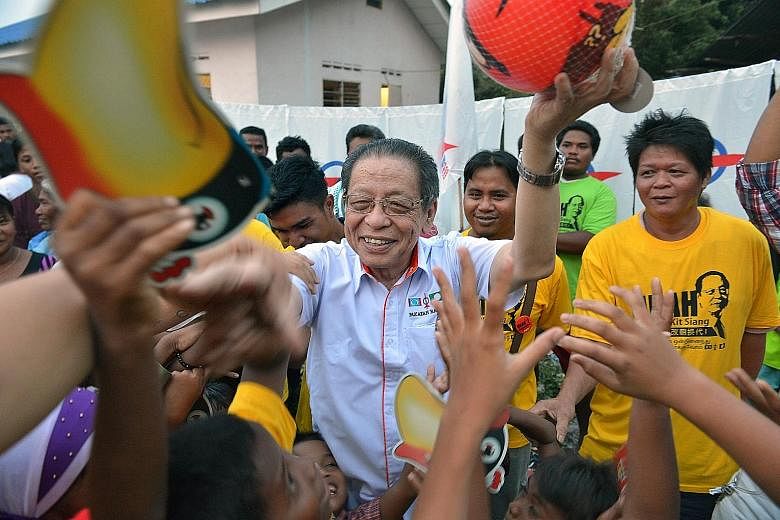The Democratic Action Party (DAP) has gone from strength to strength in Malaysia's last two general elections, and is perhaps the only opposition party certain of a strong showing in the next nationwide polls due in a year.
But on July 7, the Registrar of Societies (ROS) ordered the Chinese-dominated outfit to redo a leadership ballot dating back five years, a move widely seen as a government bid to derail its momentum.
Back in 2012, as is the situation now, DAP was rocked by the ROS declaring its party polls invalid because of irregularities just months before a general election was due to be called by Prime Minister Najib Razak.
"This ROS move is clearly designed to derail if not sabotage the DAP and its planning for the GE," said S. Rajaratnam School of International Studies' senior fellow Yang Razali Kassim.
Deputy Prime Minister Datuk Seri Zahid, whose Home Ministry administers the ROS, said a week ago that the DAP will be barred from contesting the general elections unless it holds a revote.
"If the line-up of party leaders who want to submit a candidate (for the GE) is not recognised by the ROS, then the letter of appointment cannot be issued or accepted," he said.
But it is unlikely that another vote will destabilise a party that has seen its secretary-general Lim Guan Eng and his father Kit Siang, a stalwart still regarded as its de facto leader, becoming more entrenched over the past decade.
-
TIMELINE OF THE DAP-ROS DISPUTE
-
DEC 15, 2012: The Democratic Action Party (DAP) holds an election for its 20-member central executive committee (CEC) members. Initial results are revised due to a tabulation error, leading to allegations of a fix.
JULY 30, 2012: The Registrar of Societies (ROS) directs the DAP to hold a re-election amid claims that 753 out of 2,576 delegates were barred from voting and replaced with "phantom voters".
SEPT 29, 2013: DAP holds a re-vote using the 2012 delegates list as instructed by ROS. The 20 CEC members elected are the same as the previous year.
NOV 11, 2013: ROS writes to the DAP, stating that the newly elected CEC is "suspended" until the ROS is duly satisfied.
JAN 22, 2014: DAP files for judicial review against the ROS letter.
SEPT 23, 2013: ROS settles the judicial review by saying it was merely "advising" DAP and recognises the elected CEC, so the suit is withdrawn.
JULY 1, 2017: Prime Minister Najib Razak's press secretary, Tengku Sarifuddin Tengku Ahmad, tells DAP to cease "fake news" attacks against the government and resolve its disputed CEC elections.
JULY 7, 2017: ROS issues a statement instructing DAP to re-elect its CEC as the 2013 re-vote "should have been based on the list of delegates eligible to attend and vote at the Dec 15, 2012, election".
JULY 14, 2017: DAP has yet to receive written notification from the ROS of its decision, without which it cannot proceed with the re-vote.
In 2013, despite the ROS controversy, DAP stormed to a record 38 parliamentary seats and was unbeaten in its Penang stronghold.
It is now the second largest party in Parliament after Umno, and has been part of four state governments since 2008, and still governs Penang and Selangor.
"The ruling Barisan Nasional could potentially benefit if DAP leaders who are more aggressive in challenging Malaysia's established social compact emerge victorious. This damages the opposition as a whole, as it could scare off the Malay majority," Vriens & Partners' political risk consultant Adib Zalkapli told The Straits Times, but noted that leaders who were more pragmatic have triumphed in recent party elections. He was referring to DAP's long-held view that the pro-Bumiputera policy that helps Malays and the indigenous races is unfair and prone to abuse.
DAP has become used to repeated controversy surrounding the election of its leaders. Even Mr Lim Guan Eng, who is also Penang's Chief Minister, bounced back after a poor showing in the 2005 Malacca state leadership ballot when he ended at the bottom.
Those aligned to him and his father have triumphed ever since, and what few dissenters there were have been marginalised. They include Mr Lim Guan Eng's rivals in Malacca, led by Kota Melaka MP Sim Tong Him, who quit DAP along with three other lawmakers this year.
In Penang, calls for a two-term limit for the chief ministership, which would force Mr Lim Guan Eng to step down at the next state polls, have been soundly defeated. The strong backing for the status quo means DAP's national leaders are less concerned with dissent over its political direction.
The Lims are helped by the fact that their trusted lieutenants have shot up the party hierarchy. Kluang MP Liew Chin Tong, a trusted adviser to Mr Lim Kit Siang, garnered the most votes at the 2013 revote of the nullified 2012 party ballot. Others in Mr Lim Kit Siang's inner circle include DAP's publicity chief Tony Pua and whip Anthony Loke. All three have been bandied about as Mr Lim Guan Eng's potential successor as secretary general.

